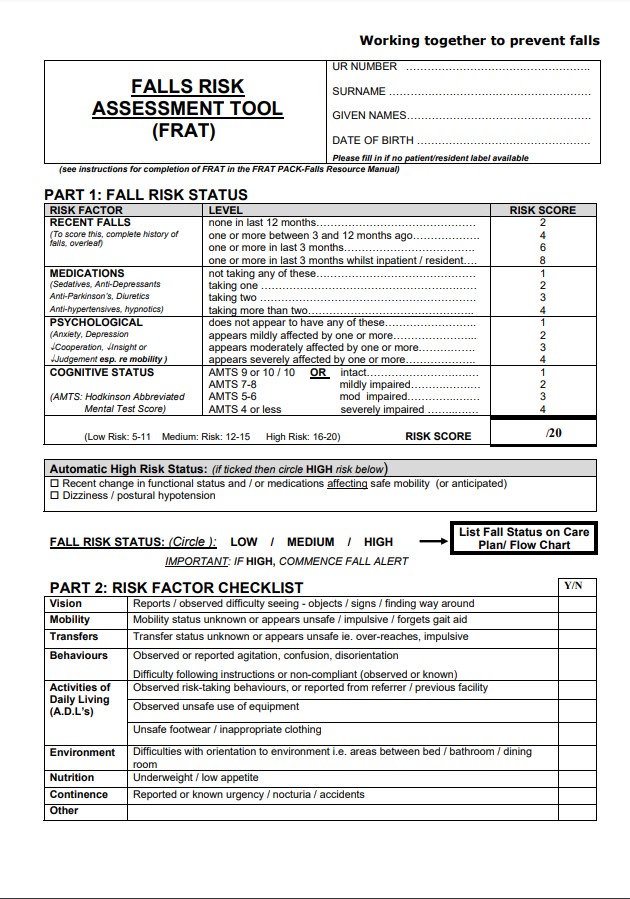The Best Guide To Dementia Fall Risk
The Best Guide To Dementia Fall Risk
Blog Article
Fascination About Dementia Fall Risk
Table of ContentsDementia Fall Risk Things To Know Before You Get ThisAbout Dementia Fall RiskSome Known Incorrect Statements About Dementia Fall Risk The 9-Minute Rule for Dementia Fall RiskThe Ultimate Guide To Dementia Fall Risk
You could be anxious since you've had a fall prior to or due to the fact that you have actually observed you're starting to feel unstable on your feet. You may have noticed modifications to your health and wellness, or just really feel like you're reducing a little. Whatever the factor, it isn't unusual to become cautious and shed self-confidence, and this can stop you doing the important things you utilized to do and make you really feel a lot more isolated.If you've had a loss or you have actually begun to really feel unsteady, inform your medical professional even if you feel great otherwise. Your doctor can examine your equilibrium and the way you stroll to see if enhancements can be made. They may have the ability to refer you for a drops risk analysis or to the falls prevention solution.
This information can be gotten with interviews with the person, their caregivers, and a testimonial of their clinical records. Begin by asking the individual regarding their background of falls, consisting of the frequency and circumstances of any type of current falls. Dementia Fall Risk. Inquire concerning any wheelchair problems they might experience, such as unsteady or trouble walking
Conduct a comprehensive testimonial of the individual's drugs, paying specific focus to those understood to raise the danger of drops, such as sedatives or medicines that reduced high blood pressure. Establish if they are taking multiple drugs or if there have actually been recent adjustments in their medicine routine. Assess the person's home setting for potential hazards that might increase the danger of drops, such as poor illumination, loosened rugs, or lack of grab bars in the shower room.
The 45-Second Trick For Dementia Fall Risk
Guide the person via the loss threat assessment form, discussing each concern and videotaping their responses precisely. Make sure that the specific recognizes the function of the assessment and feels comfortable providing sincere solutions. Calculate the overall risk score based upon the responses supplied in the analysis kind. Figure out the person's threat classification (low, medium, or high) based on the overall score and the presence of automatic high-risk standing aspects.
This strategy may consist of exercise programs to improve toughness and equilibrium, medicine changes, home alterations, and recommendations to other specialists as required. Regularly monitor the person's progression and reassess their threat of falls as required. Customize the care strategy based on modifications in their health condition or home setting. Offer ongoing education and learning and assistance to promote safety and security and minimize the news risk of drops in their everyday living tasks.
Several researches have revealed that physical therapy can assist to decrease the threat of falling in grownups ages 65 and older. In a new research study (that took a look at drops risk in females ages 80 and older), researchers calculated the economic effect of selecting physical treatment to stop drops, and they found that doing so conserves $2,144, including all the concealed prices of your time, discomfort, missed out on life events, and the bucks paid for services.
Dementia Fall Risk Can Be Fun For Everyone
Evaluating your balance, toughness, and strolling ability. A home safety and security assessment. Based on the assessment more results, your physical therapist will develop a plan that is tailored to your specific needs.
Older adults that have trouble strolling and chatting at the very same time go to a higher danger of falling. Dementia Fall Risk. To assist increase your safety during everyday activities, your physiotherapist may design a training program that will certainly test you to maintain standing and walking while you do another task. Instances include strolling or standing while counting backwards, having a conversation, or lugging a bag of grocery stores
Your physiotherapist also can determine which activities you should avoid to remain risk-free. Community-based drops prevention programs help individuals to: Minimize their concern of falling. Establish objectives for boosting their physical activity. Make their homes safer. Work out a lot more to enhance their strength and equilibrium. These programs typically are led by volunteer trainers.
Little Known Questions About Dementia Fall Risk.

Measles, or rubeola, is a highly contagious, acute viral transmittable condition triggered by the measles infection. Some people consider measles as simply a breakout and high temperature that removes up in a few days; nonetheless, measles can create navigate to these guys severe health and wellness problems, particularly in youngsters more youthful than 5-years-old. The very best protection versus measles is the measles, mumps, and rubella (MMR) vaccination.
Autumns are an usual cause of injury amongst older grownups.
The Ultimate Guide To Dementia Fall Risk

She has no history of falls, her gait is constant, and she voids with no problems. The previous nurse states that she calls for help to the restroom when she needs to go.
Instances of usual fall interventions/measures include: Making sure a person's vital things are within reach. Beyond comprehending how to make use of the Johns Hopkins Autumn Threat Evaluation Tool, it's crucial that facilities include its use right into a more extensive autumn avoidance strategy.
Report this page